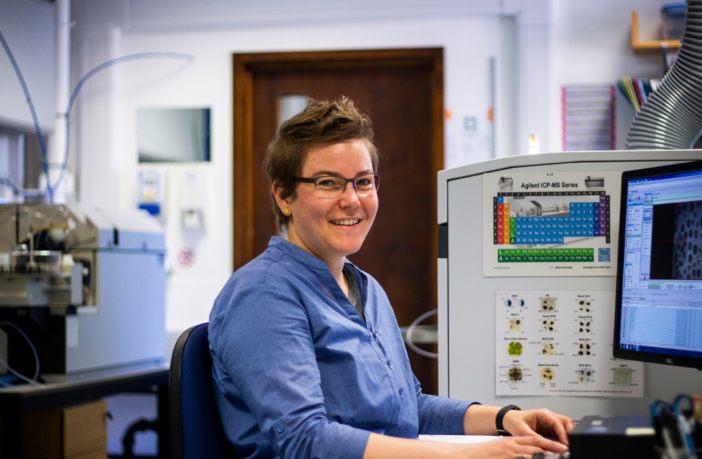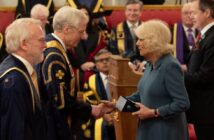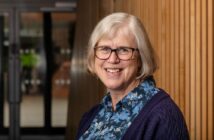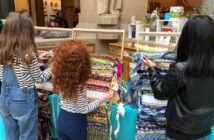Meet Dr Barbara Kunz – a Geochemist, Petrologist and Project Officer at the School of Environment, Earth and Ecosystem Sciences here at The Open University. Barbara is an expert in LA-ICP-MS analysis, which involves analysing trace elements of various geological material.
As part of British Science Week 2021 Barbara shares an insight into the innovative work happening in the lab and offers advice for other women looking to enter a career in research science…
Can you tell us a bit about what your current role involves?
I am a Project Officer in the LA-ICP-MS lab at the School of Environment, Earth and Ecosystem Sciences. LA-ICP-MS stands for Laser Ablation Inductively Coupled Plasma Mass Spectrometer. This kind of instrument allows us to drill tiny holes (thinner than human hair) in solid materials, the extracted material is then analysed for its trace element compositions. Theoretically, any solid material can be analysed, but in our lab we focus on geological material such as minerals, rocks, volcanic glasses and fossils. The research questions range from magmatic processes, mountain building, ore-formation, to palaeoclimatology and environmental aspects.
My job is to run the lab together with my colleague Sam Hammond. This means doing routine maintenance of our instruments, starting up, calibration and method development for and together with PhD students, researchers from the OU as well as other universities. In some cases I also carry out sample analysis or data reduction for people and then send them the data.
While I mainly work with other people on realising the analytical requirements for their research projects, I do try to have my own small research projects. My background is in metamorphic petrology and geochemistry and I am interested in studying geological processes that happen deep within the crust when rocks get very hot and start to melt.
What are you currently working on?
A lot of different things! The past year hasn’t been easy with limited access to lab facilities, however, this has allowed me to do things I often have little time for, such as writing and peer-reviewing scientific articles, developing a short course about the analytical methods in our lab and expanding my knowledge into other geological research fields I would like to integrate into my own research.
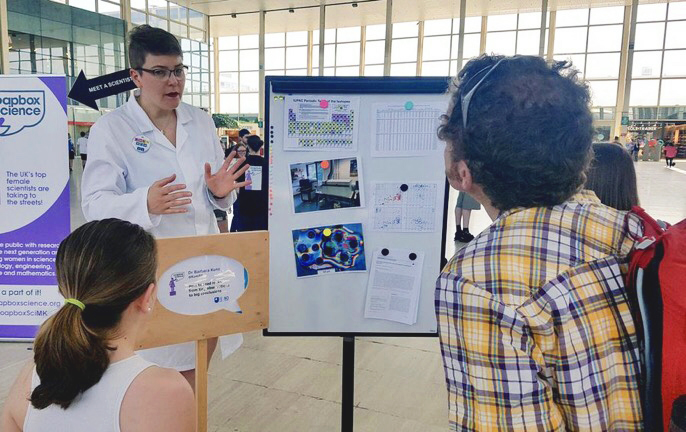
Barbara explaining her work as a LA-ICP-MS technician to a father and his daughter in the Milton Keynes shopping centre during the 2019 Soapbox Science event.
Due to the Covid-19 pandemic we are currently in the process of upgrading our lab to allow remote access of lab users, which will allow us to work together with PhD students and research while we are not allowed to be in the same room.
Research wise I am currently interested to study the behaviour of so called ‘green metals’ (e.g., Li, Be, Sn, W, etc.) during high-temperature metamorphic process in the deep crust. These metals are often found in magmatic mineral deposits formed in the uppermost part of the crust. However, we know very little about the deeper crustal processes that prime magmas to later on form such deposits. Somewhere down the road my research might be another puzzle piece that will help us to better understand the formation of those mineral deposits.
What’s the best part about your job?
One of my favourite parts of my job is to teach and train lab users in instrument setup and data reduction, or other instrument related knowledge. I do this in the lab itself as one-on-one training as well as part of workshops.
I also relish the opportunity my job provides to work on a variety of very different research projects. I like to work on projects that challenge the current analytical capabilities and require time and dedicated work to figure out ways of making it happen. While it can be challenging and frustrating, I really enjoy a good analytical challenge.
What route did you take to get to your current role?
I did my undergrad in Geology in Germany and then went on to do a PhD in Switzerland. I always enjoyed analytical work and had my first student job in the LA-ICP-MS at the University of Mainz (Germany). When I was looking for a job after finishing my PhD I saw job advertised on Twitter at the OU to become a lab technician for a large Natural Environment Research Council (NERC) grant, but I thought my skills didn’t match the job description enough to apply for the role. Luckily a mentor and now good friend who works at the OU encouraged me to apply and I got the job! Thanks to my analytical skills and hard work I was offered a permanent job as a lab technician when my fixed-term contract for the NERC grant ended.
What made you want to work in this field?
Both my parents studied science and growing up many everyday activities were flavoured with encouraging me to apply scientific skills such as observing and describing, followed by connecting knowledge and drawing conclusions.
I enjoyed science in school, but was more inclined to follow a path towards arts and creativity during that time. When I finished school, I had to decide what to study at university. I went for geology, combining my interest of science with a passion for being outdoors. As a child I had a mineral and rock collection and was fascinated by volcano’s and dinosaurs, so I guess I always had an interest in Earth Science topics.
Have you got any advice for other women pursuing careers in research science?
Creating networks and supporting each other has been very helpful for me. Finding mentors and people who believed in me and encouraged me to push onwards even in difficult times has been invaluable.
I also think we women need to allow ourselves to be more confident in our skills and abilities. There are studies that show women only go for jobs or promotions when they are at least 100% qualified, while men tend to apply when they are about 60% qualified. I am an example of that. Since then I’ve tried to be more confident in my abilities and put myself forward, daring to be bolder and it has paid off. I’m now in a permanent job in the LA-ICP-MS lab at the OU and in 2019 I won the Times Higher Education Outstanding Technician of the Year award!
Find out more:
- About Dr Barbara Kunz
- About OU research in the Faculty of Science, Technology, Engineering and Mathematics (STEM)
